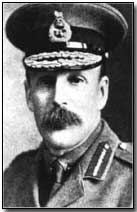Who's Who - Sir Frederick Maude
 General Sir Frederick Stanley Maude
(1864-1917) was the most successful commander to serve on the Mesopotamian
Front during World War One. Born on 24 June 1864 in
Gibraltar the son of General Sir Frederick Francis Maude (a recipient of the
V.C.), Maude was educated at Eton before entering Sandhurst to begin his
military career.
General Sir Frederick Stanley Maude
(1864-1917) was the most successful commander to serve on the Mesopotamian
Front during World War One. Born on 24 June 1864 in
Gibraltar the son of General Sir Frederick Francis Maude (a recipient of the
V.C.), Maude was educated at Eton before entering Sandhurst to begin his
military career.
He joined the Coldstream Guards in February 1884, earning the Egyptian Medal and Egyptian Star while serving with them. Maude saw service in the South African War of 1899-1902, earning a D.S.O. and Queen's South African Medal while still a Major.
Appointed Military Secretary to the Governor-General of Canada he remained in the post until the close of 1904 when he took up a series of general staff positions. By 1911 he had reached the rank of Colonel.
Maude's World War One career began on the staff of General Pulteney's III Corps in France before, in October 1914, being promoted to Brigadier-General and handed command of 14th Brigade.
Seriously wounded in April 1915 he was sent home to England for a rapid recuperation. The next month he returned to his brigade before being promoted Major-General in June 1915 and appointed to command of 33rd Division, then currently training in England prior to a posting in France.
Maude was never posted to France however. In mid-August he received orders to proceed to Sir Ian Hamilton's HQ from whence he was placed in charge of a fresh command, 13th Division in Suvla.
Overseeing the retreat from Suvla and their landing at Helles, Maude's division suffered a 50% casualty rate before its eventual transfer to Mesopotamia in March 1916.
With the signal failure of Sir John Nixon's command of Mesopotamian forces from April 1915 to January 1916, culminating in the humiliating surrender of Sir Charles Townshend's force at Kut in April 1916 - overseen by the administration in India - the War Office in London resolved to appoint their own commander. Hence Maude received orders to proceed to Mesopotamia.
Maude therefore replaced General Gorringe as commander of the so-called frontline Tigris Corps in July 1916. The following month he was given responsibility for the entire front. He immediately set about reorganising and re-supplying British and Indian forces in the region.
Appointed by the Chief of the Imperial General Staff in London, Sir William Robertson, Maude's instructions were brief and rather unusual: effectively to hold his existing line and to do nothing. In particular Robertson was keen that Maude should not make demands for resources otherwise intended for the vastly more important Western Front (so far as London was concerned).
A cautious and consistent rather than spectacular commander, Maude - known as 'Systematic Joe' - nevertheless led his forces in a series of victories up the Tigris, starting with the Second Battle of Kut right up to the capture of Baghdad on 11 March 1917.
Ironically the British - and Robertson in London - found themselves a victim of their own success. Maude's continuing unbroken run of victories ensured that no scaling down of operations in Mesopotamia could feasibly be considered as Maude's reputation grew in the Muslim world.
Thus British operations were widened to stem threats from Turk forces on the Euphrates, Diyala and Tigris rivers. April 1917 saw Maude triumph again, at Samarrah, and he continued his offensive at Ramadi and Tikrit before calamity struck in early November 1917.
Struck down with cholera, probably via contaminated milk (rather than by poisoning as was speculated by some at the time), Maude died on 18 November. Shocking as it was to many, particular to his frontline troops, it did give Robertson the opportunity to scale back operations in Mesopotamia.
General William Marshall was appointed to replace Maude in Mesopotamia.
Click here to read Maude's official despatch detailing operations in Mesopotamia between December 1916 and March 1917 leading to the fall of Baghdad.
The Russian war ace Alexander Kozakov claimed 20 victories during the war; his nearest compatriot, Vasili Yanchenko, claimed 16.
- Did you know?
